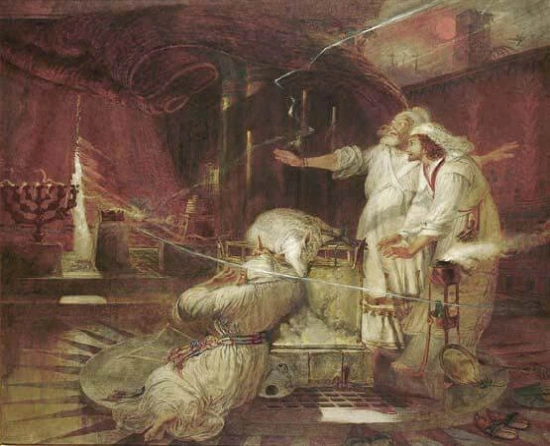5
And when the camp setteth forward, Aaron shall come, and his sons, and they shall take down the covering vail, and cover the ark of testimony with it:
6
And shall put thereon the covering of badgers' skins, and shall spread over it a cloth wholly of blue, and shall put in the staves thereof.
7
And upon the table of shewbread they shall spread a cloth of blue, and put thereon the dishes, and the spoons, and the bowls, and covers to cover withal: and the continual bread shall be thereon:
8
And they shall spread upon them a cloth of scarlet, and cover the same with a covering of badgers' skins, and shall put in the staves thereof.
9
And they shall take a cloth of blue, and cover the candlestick of the light, and his lamps, and his tongs, and his snuffdishes, and all the oil vessels thereof, wherewith they minister unto it:
10
And they shall put it and all the vessels thereof within a covering of badgers' skins, and shall put it upon a bar.
11
And upon the golden altar they shall spread a cloth of blue, and cover it with a covering of badgers' skins, and shall put to the staves thereof:
12
And they shall take all the instruments of ministry, wherewith they minister in the sanctuary, and put them in a cloth of blue, and cover them with a covering of badgers' skins, and shall put them on a bar:
13
And they shall take away the ashes from the altar, and spread a purple cloth thereon:
14
And they shall put upon it all the vessels thereof, wherewith they minister about it, even the censers, the fleshhooks, and the shovels, and the basons, all the vessels of the altar; and they shall spread upon it a covering of badgers' skins, and put to the staves of it.
15
And when Aaron and his sons have made an end of covering the sanctuary, and all the vessels of the sanctuary, as the camp is to set forward; after that, the sons of Kohath shall come to bear it: but they shall not touch any holy thing, lest they die. These things are the burden of the sons of Kohath in the tabernacle of the congregation.








